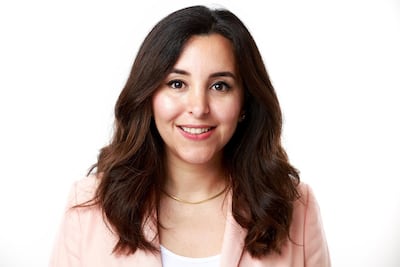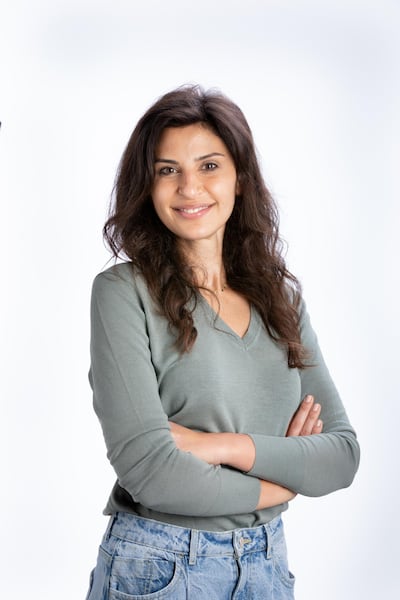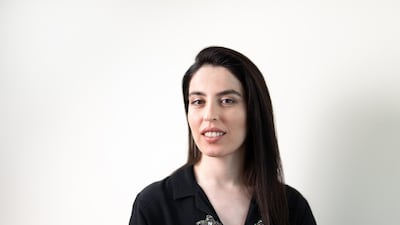Cartier announced the eight winners of its 2021 Women's Initiative Awards, with Basima Abdulrahman from Iraq scooping the top prize for the Middle East and North Africa (Mena), for her company Kesk.
Speaking with The National, Abdulrahman explained what this recognition means. "Winning Cartier Women's Initiative award and being selected as a laureate in the MENA region makes me feel more hopeful and stronger. It sends a powerful message that our work is needed now more than ever."
"Women-led start-ups received only 2.3 per cent of venture capital funding in 2020 and even fewer became unicorns. The CWI initiative is important because it is challenging social norms and gender stereotypes to unlock women's potential. It provides access to capital, human resources, and a leadership capacity development program. Its success lies in the fact that they invest in a women-led future."
The competition
Since launching in 2006, Cartier Women's Initiative has supported female entrepreneurs around the world.
The annual prize aims to support women-run and women-owned businesses that have a strong sustainable, social, or environmental impact. Open to any country and any sector, the award is intended to drive change by empowering female entrepreneurs.
There are eight categories, and the winning laureate in each category receives $100,000, while runners-up receive $30,000.
All 24 finalists will receive one-on-one mentorship, attend workshops and be trained in media visibility. They will also join an Insead Business School impact entrepreneurship programme. To date, the award has supported more than 260 women entrepreneurs from more than 60 countries, and handed out $4 million in prize money.
For 2021, a new category of Science & Technology Pioneer Award was launched, and applicants from Mali, Iraq and Myanmar were accepted for the first time. The final 24 were selected from 876 applicants from 142 countries, Cartier said.
Speaking ahead of the ceremony, Cyrille Vigneron, president and chief executive of Cartier International, said: “Women have always had a pivotal role at Cartier, both as a driving force and an endless source of inspiration.
"In these challenging times, they are more admirable than ever, proving their resilience in the face of adversity and their ability to create concrete and durable solutions not only for themselves, but for their communities and the world at large.
"It is our honour and pride to support these women who keep pushing the boundaries in order to make the world a better and more equal place.”
The winner: Kesk
Abdulrahman's prize winning company, Kesk, was founded to help reduce the difficulties faced by many Iraqis in need of a stable electricity supply.
Hailing from Iraq, Abdulrahman knows first-hand the difficulties of navigating the summer heat on a few hours of electricity a day. As the national grid struggles to keep pace with demand, Iraqi citizens are often left trying to cope with temperatures of up to 50°C with little or no air conditioning.
“The electricity crisis has been a big deal. People protest about it once or twice a year,” Abdulrahman explains. “Iraqi citizens get no more than 12 hours of electricity from the main grid each day. Iraqis are searching for alternative sources of energy.”
While studying for her masters in civil engineering in the US, Abdulrahman was introduced to the concept of green building design and the rating system known as Leadership in Energy and Environmental Design. Seeing the potential for helping solve Iraq’s power supply issues, she founded Kesk in 2018 as an engineering and design consultancy.
However, with little interest from the Iraqi government, and local businesses facing several concerns, Kesk shifted to building and testing its own stand-alone solar AC units in 2020.
To make the units cheaper and simpler to run, the expensive battery that stores power accumulated during the day was removed. While the downside is that the unit cannot deliver power at night, the substantially reduced price, Abdulrahman believes, makes it a viable alternative for those facing outages.
“You have solar AC working all day, so your house will cool down,” she says.
With the average Iraqi household running four AC units, Abdulrahman believes that shifting even one to solar power will have a huge impact.
“This kind of product is going to be very helpful for Iraq because AC units consume 60 to 70 per cent of Iraq’s energy,” Abdulrahman explains. “In the next 12 months we plan to install at least 100 units.”
With ambitious plans to sell 3,000 to 5,000 units over the coming five years, Abdulrahman believes there is huge potential beyond homes.
“We want this to be not just for individual consumers but for businesses, schools, universities, hospitals—any kind of building that demands energy from nine to five.”
To enable people to adopt this technology, Kesk is working with financial institutions to offer instalment plans, and is training technicians and creating employment opportunities.
Kesk is also developing a portal to gather data about energy savings, and Abdulrahman and her team are looking towards a future where green building practices are implemented across the country. With the ability to create buildings that produce clean energy, harvest rain water, help with biodiversity and even produce food through concepts such as rooftop farming, Abdulrahman’s wish is that Iraqis will be less reliant on the power grid.
Runner up : MonkiBox

Also from the Middle East is Rana El Sakhawy, who founded MonkiBox in the UAE.
When El Sakhawy became a mother, she was keen to ensure that she was fully nurturing her child’s development. Swamped with well-meaning, but often conflicting advice, however, El Sakhawy felt overwhelmed.
“You have all this information coming from friends, from doctors, from mum groups, from parent groups," she says.
Keen to help other new parents, she founded MonkiBox in 2018 as a toy curation subscription service, offering parents the best products and information for their child’s stage of development. Not long afterwards, however, El Sakhawy began designing and making products that merged play and science for children of every age.
“I used to spend countless hours just researching and trying to understand what my baby's going through. How can I help her develop? And how can I give her the best start in life?” she explains. “Parents buy toy after toy, trying to figure if it is going to add anything to the child’s life. What we're doing is providing them with the play essentials.”
It is widely accepted that 85 per cent of human brain development happens before the age of five. However, while every parent wants to give their child the best possible start in life, El Sakhawy realised that across the Mena region, only a third of children are enrolled in pre-primary education, one of the lowest rates in the world.
Aimed at maximising the development of children in the first three years of life, MonkiBox has created products such as black-and-white cards to give the youngest babies visual stimulation, and Montessori-inspired tools and toys for older babies. Each product comes with information to help parents understand the differing developmental stages.
Already, MonkiBox has helped 1,300 families, and El Sahwaky is keen to reach many more.
“Seeing how the parents react is very satisfying,” she says. “I love hearing a parent tell us, ‘Oh, wow, I feel so in tune with what my child is going through’ or ‘It's amazing. I'm looking at my child in a different way.’”
El Sahwaky is keen to expand beyond the UAE, to reach the half million families across Mena and neighbouring countries.
“We want to be in all the major cities. We want to expand geographically and impact as many children as possible,” she says.
As subscriptions grow, El Sahwaky has plans to create products for children beyond the age of three. “Our ultimate vision is to become the parents’ partner when it comes to their child's early development, and empower parents to become the main promoter of their child's development,” she says.
Runner up : Geek Express

The third fellow from this region is Manal Bahlawan, who founded Geek Express in Lebanon. As runner-up, her company will receive $30,000 in funding.
With a background in investment banking, Bahlawan fell into teaching coding to children by accident. Having opened a gallery in Beirut's Saifi Village, entitled Geek Express, Bahlawan and her business partner were looking forward to offering memorabilia, collectibles, and street art to customers. However, the reaction to one product, a game made by US company Sphero, proved a catalyst for a different path.
Called "littleBits Electronics" the game contains built-it-yourself elements to teach children electronics and engineering, yet no one was buying it. When she explored why, Bahlawan discovered that parents felt uneasy about the knowledge needed, and instead preferred to steer clear.
Seeing a knowledge gap, Geek Express began hosting two-hour weekend workshops, to teach children how to engage with the game, which become so over subscribed, a full day was needed to accommodate the children interested in attending.
“The first group of 20 kids became 100,” Bahlawan explains. “Eventually we decided that Geek Express needed to become an ed-tech platform that teaches technology in a fun and accessible way.”
With a focus on teaching Steam (science, technology, engineering, art and maths), Geek Express has now expanded into a platform that gives students aged kindergarten to 18 years a sound footing across multiple fields.
“There is a huge demand worldwide for Steam skills,” she explains. “These skills could produce researchers who find cures for cancer or solve the problem of global warming.
"I am not a techie," she says. "I started Geek Express selfishly for my kids, because I really wanted technology training to be easier and more accessible. There was a barrier that shouldn't exist."
Studies suggest that teaching coding to young children enhances logical thinking, yet across the Middle East, there is little access to Steam-based education.
Geek Express has been designed to offer flexible and fully customised learning, where students can adapt their learning programme through online coding programmess, home-delivered DIY boxes, self-paced video lessons, and even bootcamps for more intensive learning. All the online courses are taught by university students.
“We have approximately 75 part-time teachers who give the courses online. They’re trained and Microsoft certified. They’re university students and their job with Geek Express enables them to pay their tuition," says Bahlawan.
There are plans to roll out these teaching practices across other countries.
“We’ve started with the UAE in 2021. Saudi Arabia, Egypt, and Bahrain, are on the timeline. The idea is to become the leading ed-tech hub in the Mena region," she says.

